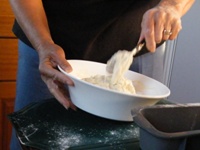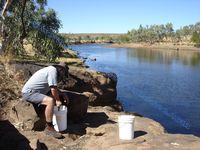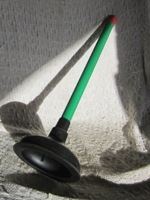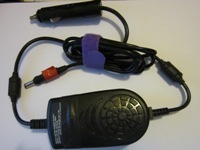
Do you want to bush camp and use a heap of electric appliances and light up your camp like an ocean liner? Or can you enjoy
the evening simply with just a few LED lights or a lantern if out doors, and cook on gas? A 12 volt system with a small inverter
to charge your phone or camera batteries should be adequate. Many appliances such as televisions come in 12 volt.
Do
you need to take a generator? Your camping neighbours well may object to the sound of a generator spoiling the peace of their
nature experience. The cheaper imported generators are not only noisier than the well reputed brands such as Honda and Yamaha
which just purr along, but the rhythm is somehow annoying. If you don’t have solar power, a generator will ensure you
can keep the fridge cold, even when camped in the one place for a few days. However if your camping holidays are short you can
choose more non refrigerated foods, take a good esky and some ice bricks and dispense with the room taken up with a generator and
cans of petrol. Two and three litre juice bottle with handles make excellent ice bricks and stay cold for some days. Water
can then be used for drinking, cooking or washing.
Can’t live without a microwave, bread maker, yoghurt maker or Cappucino machine? So long as you have the room, allowance for the weight, and an adequate power supply you can take them, but do you need them? How often will you use them? If just occasionally, try leaving them behind. I can't help with the Cappucino, but you can make bread easily mixing and kneading it by hand in a bowl. Making bread rolls is quicker and can be more successful than full loaves. See making bread on the road in the food and cooking section. The best place to raise the dough is in your car. On really hot days, your caravan will get as hot as any yoghurt maker. Electrical appliances are generally heavy and bulky, and not really needed if you have a gas stove.
Simple appliances can save you needing to provide a power house for your camping.
See Power Sources for more about choosing the right power system for you
Do you need a bank of water tanks and a long hot shower every day, or can you just ‘go camping’ and have a good sponge over on days between showers? See Economical use of water when it is in short supply.
Simple water drawing: Do you need external
pumps and filters to fill your tanks from streams and lakes, or will getting a bucket of water and using direct from the bucket be
simpler and easier? Lots of choices for the easy life with all mod cons, or just simple light weight camping gear.
See more about choosing Which Fridge
You may be used to having a large fridge full of food and drinks and a chest freezer full of meat and vegetables at home, but do you really need everything to be refrigerated when camping?
Simple alternatives
to refrigerated foods: Consider UHT milk, which only needs to be refrigerated once opened. Use powdered milk in all cooking
applications. Use dried vegetables instead of fresh or frozen in stews and casseroles. Cool drinks for the next day outside
overnight and put into the fridge in the morning. Keep a supply of canned products, such as baked beans, tuna, meat pies and tinned
stews if you and your family like them. Cheese can be purchased non refrigerated and foil wrapped - Kraft cheese. This
cheese will need refrigeration after opening if you won't be using it all within a few days. Rice and pasta are easy to cook
and have a very long shelf life. You can even buy dehydrated foods as used by hikers at many camping stores and on line
sources if storage is really an issue. Settlers Foods is one company manufacturing a variety of dried meals. Back Country
Cuisine is another source. Even if you don’t anticipate these sorts of meals as your daily diet, a few packets set aside for
times of shortages and emergencies would be worthwhile. What’s more without relying on refrigerated foods, you will find you
can last a lot longer between shopping trips. If the weather is not extremely hot, drinking water and vegetables can be kept
in an Esky by opening to the cool of the night and closing it first thing in the morning. Choose cuts of meat that take up little
room, such as mince rather than T-bone steaks if you have a small freezer section in your fridge.
Even without any
refrigeration, if you are in areas where you can access shops often, you can buy fresh meat and vegetables and use that evening, with
simple meals made from non refrigerated products for days in between. Baked bean jaffles cooked on a campfire are usually a
family favourite when camping. In cool weather, we find instant packet soup and toast a good alternative to a big cooked meal
on alternate days. For a few other ideas about no fridge cooking see here
This will vary according to what you use. If you run a fridge on gas and use the hot water system daily your gas bottle will
be gone in a fraction of the time it takes to use a full bottle for just cooking your meals. If you want to make your gas supply
last even longer, look for camp grounds with free barbecues. Some National Parks in the
If you are going camping for a long weekend, one 4.5 kg bottle will be adequate, whereas if you are going on the road for an extended period, you will need a second bottle, and larger caravans are usually fitted with two 9 kg bottles. Using our hot water system most nights for short showers and basic cooking a 9 kg bottle lasts us around six weeks. If being used mainly only for cooking, one bottle lasts about three months. We do not run our hot water system for long periods like many others do; twenty minutes in cool climates or fifteen in hotter areas gives us warm showers. A kettle boiled on the stove is the quick and simple way for washing dishes.
Prices of filling bottles varies greatly between different towns, with camping stores in larger towns usually being much cheaper for a refill than the local service station or hardware store in an inland town. There is also the option of 'swap and go' 8.5 kg bottles. This is not the cheapsest option and the bottles may not fit your bottle brackets.
Bottles are date stamped and after ten years you cannot get the bottle filled without it first being inspected, refurbished and approved. This may well exceed the cost of a new bottle.
While you are on holidays, let the cook have a holiday too. Simple meals can be healthy and enjoyable. Particularly when
camping out, and often for simplicity when cooking in the caravan, I cook meals in one pot or pan. Potatoes and onions can be
sliced and cooked on a lightly oiled pan then put to one side while the steak is cooked. Even greens can be cooked in the pan. Casserole style meat and vegetable dishes cooked in one large pot can make tasty meals quickly and easily. See more ideas for
simple camp meals on the Food and Cooking tips page. One pot cooking not only helps give the dish washer a bit of a break, but
uses less water too. The large pot or pans can be wiped clean then used to heat the water for washing up – all done in the pot
or pan. Occasionally we are purchase a hot roast chicken late in the day if passing through a town where these are sold. Coles and Woolworths usually have them ready to go, and i roast vegetables to complete the meal.
Do you need
an oven? In a small caravan or camper, an oven may not be included. Large caravans may have a full sized oven, and smaller
ones a small yacht oven. Looking at keeping camping simple, an oven is not necessary. Even in our caravan, because we
move frequently my small oven doesn’t get much use. It is useful when making a damper loaf, bread rolls or browning cheese topped
dishes. It doesn’t get as hot as my home oven so more time needs to be allowed for oven cooked dishes, so they are not a good
choice when stopping late in the day. Those who can do wonders in a camp oven on a camp fire could no doubt do the same in a
camp oven stove top if there was no oven. There are also other alternatives such as slow cookers and outdoor cookers such as
Cobb.
Fast and slow cookers: There are many options for having a meal without waiting for hours when stopping late. Some campers use a pressure cooker. This is a large and heavy item, and not one that is take. However when touring
Some campers prefer the slow cooking method of a Shuttle Chef http://www.thermalcookware.com/ These work by partially
cooking the food in the inner pot for 10 – 15 minutes then placing it in the insulated out pot (a large Thermos) which retains sufficient
temperature to slow cook the food for up to eight hours. If desired, the food can be brought back to the boil before serving. With a little bit of preparation in the morning, the pot can remain in the caravan (in the sink for safety) until camping time, when
the meal can be served. Popular for cooking corned beef as well as curries and stews, it can also be used to cook cakes and
breads and make yoghurt. Using a thermal cooker also saves gas.
There are a number of similar products
available, including Dreampot https://www.dreampot.com.au/
These products can be equally as effective at keeping food cold for
a number of hours.
For outdoor cooking without an open fire (camp fires are unacceptable in fire risk areas), a Cobb Cooker
be used to cook a variety of meals, including grills, roasts, pizzas, cakes and breads, with just a few heat beads http://www.cobb.com.au/ Exercise caution when disposing of heat beads as they can retain the heat for a long time.
When camping away from
the caravan for only one or two nights, I take pre-cooked mince and vegetables ready to make into jaffles. Simple and easy
to get an enticing aroma and a tasty meal going quickly at the end of a long day sightseeing, using either on a campfire or portable
camp stove. We have an Engel fridge in the car to keep our food chilled when camping out.
Simple ironing substitute: Clothes can have the wrinkles shaken out of them and be pulled into shape when hanging out to dry to avoid
the need for ironing, even with cotton fabrics that I would iron when at home. Creases can be put into jeans and slacks and
pegged onto the line or airer this way to save the need for ironing. If necessary, irons can usually be hired from laundries.
Simple clothes drying: A lot of washing can fit on a fold up clothes airer, and this can be used to follow the sun when
you are stopped. If the night air will be damp, bring the airer inside overnight and put out again in the morning. When
you leave, hang the by now air-able washing around your caravan or motor home, and spread on the bed on clean towels to ensure the
bedding stays quite dry. Most will be ready to put away when you stop. If not, there is always tomorrow. When we
had a fold up camper, washing was aired by pegging it to the mesh cargo barrier which we had in our tow vehicle.
Simple
clothes lines: You can purchase fold out lines that hook onto the van and mini rotary hoists, but are they any better than a fold
up airer, a rope strung under an annex, between trees, or between a tree and your vehicle? Try and keep washing out of sight of the
road; this makes you look like you are squatters. Hanging washing where it is visible is not acceptable in “leave no trace”
or overnight rest areas.


Washing clothes is a necessary chore whether done daily in a bucket, or once a week at a laundromat. Who wants to do ironing
when on holidays? Bear washing ease in mind when selecting your clothes and choose colours which will not show stains.
You don't want to spent extra time soaking or bleaching the washing.
Simple washing machine: We use two twenty litre buckets with tight fitting lids, purchased from a Chicken take-away outlet. They can be purchased new from hardware stores such as Bunnings. One is used for the washing and the other for the rinsing, usually using water collected from sources other than our on board tanks, be it drawn from a stream or lake or from a caravan park tap as we leave. The theory is that the movement of the caravan agitates the clothes while you are travelling, but with our stable caravan it is not quite enough, so we have a plumbers plunger (the typed used to put pressure on sink drains to unblock them) for easy agitation, and for using when stationary such as when camped beside a lake for a week or two. It is easy to put the clothes worn the previous day into the wash bucket before leaving in the morning. At lunch time we transfer them to the rinse bucket. The water can be used for a day or two, with the rinse water graduating to the wash bucket when a new clear rinse is needed.


See more about options you can choose when Starting Out and setting up your caravan, motorhome or camper.
Australia So Much to See
Water - how much do you really need?
How much power do you really need?
What about a fridge and freezer?
Levelling your caravan - the
simple way to check
Mail - do you really need to pick up your mail?
Photography:
Choosing a simple easy to use camera for holiday snaps
Photography: Backing up photos and documents, keeping a written record, simple
programmes
Keys - What about all those keys?
Housekeeping - Keeping it simple